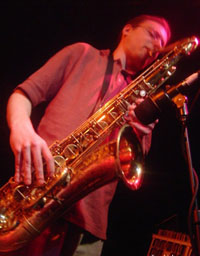
Jeff Sackmann is a composer, saxophonist, and bandleader with an embarrasing affection for bubblegum pop.
In an effort to create serious music for his 15-piece jazz orchestra, Oy Christina!, he has combined baroque fugue with Justin Timberlake, introduced serialism to Eminem, and spiced up dance mixes with Coltrane changes. For his trio Single White Female, among others, he has written several dozen pieces for small jazz ensemble that occasionally bridge the gap between chamber music and traditional combo playing.
As a saxophonist, Jeff spent several months performing with Clyde Stubblefield, the original funky drummer. He plays with a variety of rock bands in New York City and spent three years as the music director for the swing band Little Red and the Howlers.
Hailing originally from Spokane,Washington, he spent his undergraduate years at New York University, did graduate work in English Literature at the University of Wisconsin-Madison,and studied music at Berklee.
|

9.29.2006
Minimalist Free Improv
Lately, I've been getting together with a drummer friend of mine and playing improv duets. We met through a shared interest in (among other things) Morton Feldman, and in our playing, we've decided to aim for something more Feldman-esque than free improvisation usually turns out to be.
As with just about everything involved in the creation of free improv that doesn't suck, this is harder than it sounds. (Even if you've never done much free improvisation, you probably know this, because you've heard so many horrible examples of the form.)
It's particularly tough for me: like most musicians my age (and saxophonists of any age), I learned to improvise playing bebop. I started drifting in the direction of the avant-garde before I even knew what it was, but no matter how far afield my improv became, it was always based on the idea of narrative. I had always been taught that improv at its best should be compositional--variations on a theme, developed linear ideas, etc.--and that seemed more important than ever when there's no established form. Most of the free music I played with friends in college was all about the narrative: work off of each others' ideas, build toward a climax, then stop and do it again.
This, of course, is what a great deal of free improv is--and some of it is very good. But there's no way to reconcile that approach with a goal of meditative, overtone-focused, drama-free results.
Yesterday, we made some breakthroughs, in part due to an unlikely source. Instead of alto sax, I played clarinet. Even my crappy Yamaha student model blended better with various cymbal sounds and the overtones in snare rolls. Because more interesting sounds came out, I didn't feel the same need to play more. It also helped that I'm not a very good clarinet player, so it made more sense to play long tones and simple patterns.
Next week, I'll probably go back to the saxophone--at least part of the time--but with a new sense of how drum/reed duets can work. As far as I know, Feldman wrote no music for the saxophone. But I hope to at least figure out how he could have.
posted by Jeffrey Sackmann
|
| |



